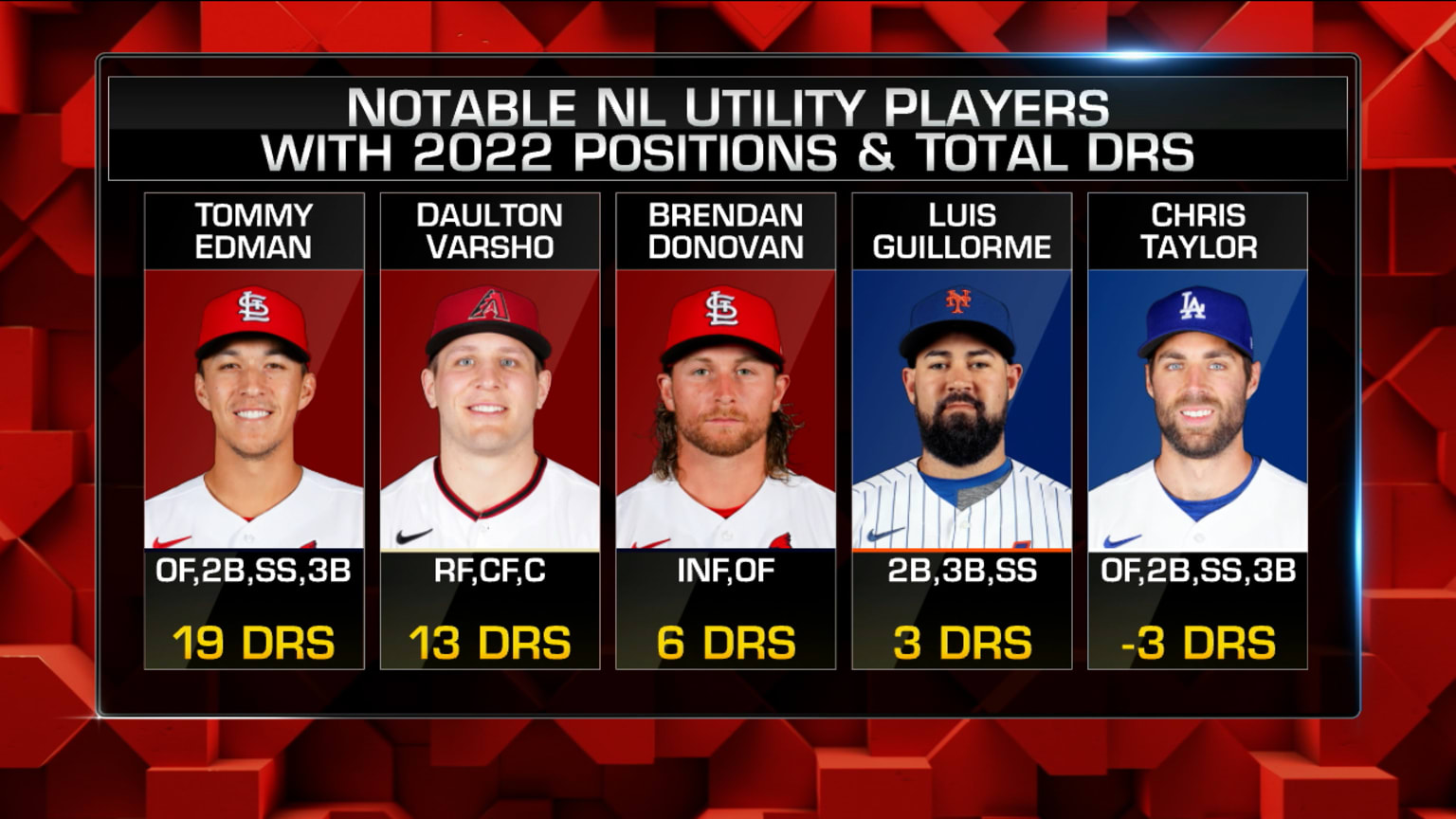A utility player in baseball is a versatile athlete. They can play multiple positions on the field.
In baseball, not every player fits into a single role. Enter the utility player, a true asset to any team. They bring flexibility and adaptability, filling in wherever needed. This role demands a broad skill set and a deep understanding of the game.
A utility player can switch from infield to outfield, or even catch if required. Their presence offers strategic options for managers. Understanding what makes a utility player essential helps appreciate the game’s depth. In this blog, we’ll explore their role, skills, and impact on the team. Discover how these players become indispensable in baseball.

Credit: www.mlb.com
Introduction To Utility Players
Baseball is a game of strategy and skill. Each player has a unique role. Some players stand out due to their versatility. These players are known as utility players.
Definition And Role
A utility player can play multiple positions. This makes them very valuable to their team. They can fill in wherever needed. This flexibility allows managers to make strategic decisions.
| Position | Skills Required |
|---|---|
| Infield | Quick reflexes, strong arm |
| Outfield | Speed, catching ability |
| Catcher | Endurance, game knowledge |
Utility players often have a deep understanding of the game. They must know the ins and outs of each position. This knowledge makes them a strategic asset to any team.
Historical Context
The concept of the utility player has evolved. In the early days of baseball, teams had fewer players. This meant players had to be more versatile. Over time, the need for specialized roles grew.
Yet, utility players remained important. They adapted to changes in the game. Some of the most famous players started as utility players. Their ability to play multiple positions made them legends.
- Joe McEwing – Known for his versatility in the late 1990s.
- Ben Zobrist – Key player in the 2016 Chicago Cubs World Series win.
- Chris Taylor – Important for the Los Angeles Dodgers’ success.
These players showed that versatility is a valuable skill. They proved that being able to play multiple positions is a strength.
Skills And Abilities
A utility player in baseball is a vital asset to any team. Their skills and abilities set them apart. They bring unique value by playing multiple positions and contributing both offensively and defensively. Let’s delve into the key skills and abilities that make a utility player indispensable.
Defensive Versatility
Defensive versatility is a core strength of a utility player. They can play various positions with ease. This flexibility allows coaches to make strategic decisions during games. It also helps in managing player injuries. A utility player can fill in gaps without compromising team performance.
They must have a deep understanding of different positions. This includes infield and outfield roles. They need to be quick on their feet. Reaction time is crucial. Their ability to adapt quickly is essential for defensive success.
Offensive Contributions
Besides defensive skills, utility players also contribute offensively. They can bat in different spots in the lineup. This adaptability helps the team in various situations. They often have solid batting averages. Their on-base percentage is usually impressive.
Utility players can be reliable pinch hitters. Their hitting skills make them valuable in tight games. They also have the ability to steal bases. This adds another layer to their offensive contributions. Their versatility at the plate is a significant asset.
Training And Preparation
A utility player in baseball must be versatile. They need to be ready for any position on the field. This requires intense training and preparation. Below, we will explore the key areas of training for a utility player.
Physical Conditioning
Physical conditioning is crucial for a utility player. They must be in top shape. Here are key components of their physical training:
- Strength Training: Build muscle for hitting power and fielding strength.
- Cardio Workouts: Improve stamina for long games and quick sprints.
- Flexibility Exercises: Enhance range of motion to prevent injuries.
Each component plays a significant role in ensuring the player can handle any position effectively.
Mental Readiness
Mental readiness is as important as physical conditioning. A utility player needs to be mentally sharp at all times. They must quickly adapt to different positions and strategies. Key aspects include:
- Game Knowledge: Understand the rules and strategies of different positions.
- Focus Drills: Improve concentration and reaction times.
- Stress Management: Stay calm under pressure during critical moments.
These mental exercises help a utility player stay prepared and ready for any challenge on the field.
Impact On Team Dynamics
A utility player in baseball significantly impacts team dynamics. Their ability to play multiple positions brings various advantages. These players are vital for maintaining balance and adaptability within the team. Let’s explore how a utility player affects team dynamics.
Flexibility In Lineup
Utility players offer great flexibility in the lineup. They can fill in for injured players. Managers can rest starters without losing quality. This adaptability keeps the team performing well. It allows for strategic decisions during games.
Boosting Team Morale
Utility players often boost team morale. Their willingness to play anywhere shows commitment. Teammates respect and appreciate this dedication. It creates a positive atmosphere. Players feel more supported and united. This unity often leads to better team performance.
Famous Utility Players
In baseball, a utility player holds a special place. They are versatile athletes who can play multiple positions. This adaptability makes them invaluable to their teams. Over the years, many utility players have become famous for their skills and contributions.
Past Legends
Some of the greatest utility players in history have left a lasting mark. These athletes were known for their ability to excel in various roles. They played with passion and skill, making them legends of the game.
- Pete Rose: Known as “Charlie Hustle,” Rose played almost every position except pitcher and catcher. His versatility and fierce competitive spirit made him one of baseball’s all-time greats.
- Ben Zobrist: Zobrist’s career spanned over a decade, during which he played every position except catcher and pitcher. He was a key player in the Chicago Cubs’ 2016 World Series win.
- Tony Phillips: Phillips played all around the diamond, from second base to the outfield. His adaptability and consistency were invaluable assets to his teams.
Current Stars
Today’s game also features standout utility players who continue to impress. These athletes bring flexibility and depth to their teams. They are often the unsung heroes who make a significant impact.
- Chris Taylor: Taylor is known for his ability to play infield and outfield positions. He has been a crucial part of the Los Angeles Dodgers’ success in recent years.
- Enrique Hernandez: Hernandez, or “Kiké,” is celebrated for his versatility. He can play almost any position, making him a valuable player for the Boston Red Sox.
- Marwin Gonzalez: Gonzalez’s ability to play multiple infield and outfield spots has made him a key player for several teams. His flexibility adds depth to any roster.

Credit: en.wikipedia.org
Challenges Faced
Being a utility player in baseball comes with a unique set of challenges. These players are expected to adapt to different positions and roles on short notice. This constant shifting demands a high level of skill, flexibility, and mental toughness. Let’s explore some of the key challenges faced by utility players.
Constant Adaptation
Utility players must constantly adapt to new positions. This means learning the nuances of each role quickly. They need to understand the different skills required for infield and outfield positions. This can be physically and mentally exhausting.
Playing multiple positions can lead to increased chances of errors. Utility players must maintain focus and precision. They often practice more than their teammates. This helps them stay ready for any role.
Staying versatile requires learning new techniques regularly. Utility players often face situations they’ve never encountered before. They must think on their feet and make quick decisions. This constant adaptation is both challenging and rewarding.
Recognition And Value
Utility players often struggle with recognition. They don’t always get the same spotlight as star players. Their contributions can go unnoticed by fans and media. Yet, their value to the team is immense.
These players provide depth and flexibility to the roster. They can step in when starters are injured. This makes them invaluable during long seasons. Coaches and teammates understand their worth, even if fans don’t always see it.
Another challenge is finding a defined role. Utility players can be seen as jacks of all trades. This can hinder their chances of securing a consistent starting position. They must continually prove their value to the team.
| Challenge | Impact |
|---|---|
| Constant Adaptation | Requires learning multiple positions quickly |
| Recognition and Value | Often overlooked by fans and media |
In summary, utility players face unique challenges. They must adapt constantly and seek recognition. Their role is crucial to the team’s success. Their versatility makes them invaluable, even if they don’t always get the spotlight.
Future Of Utility Players
The future of utility players in baseball is bright. These versatile athletes are becoming more vital to teams. With the game evolving, their roles are expanding and gaining importance. Let’s explore how these changes are shaping the future of utility players.
Evolving Roles
Utility players are no longer just backups. They are now key contributors. Teams are using them in multiple positions. This flexibility allows teams to adapt quickly. A utility player can fill in for an injured teammate. Or play different positions in a single game. Their role is evolving to meet the demands of modern baseball.
Increased Importance
As the game evolves, so does the value of utility players. They offer managers more options. Having a player who can play multiple positions is a huge advantage. This makes roster management easier. Teams can carry fewer players and still cover all positions. As a result, utility players are more important than ever. They are now an essential part of a winning team strategy.
Credit: en.wikipedia.org
Frequently Asked Questions
What Is A Utility Player In Baseball?
A utility player in baseball is versatile and can play multiple positions. They provide flexibility to the team’s lineup.
Why Are Utility Players Important?
Utility players are crucial as they offer depth and flexibility. They can fill in for injured players and adapt to various roles.
Can A Utility Player Be A Starter?
Yes, a utility player can be a starter if they excel at multiple positions and perform consistently well.
How Does A Player Become A Utility Player?
A player becomes a utility player by showcasing skills in multiple positions. Coaches recognize their versatility and adaptability.
Conclusion
A utility player in baseball brings great value to any team. They can fill in different positions as needed. This flexibility helps the team in many situations. Fans and coaches appreciate their versatility. Teams often rely on them during injuries or slumps.
Utility players are key to a successful season. They may not always get the spotlight but are crucial. Their role is essential and supports the team’s overall performance. So next time you watch a game, notice the utility players. They play a big part in every win.





